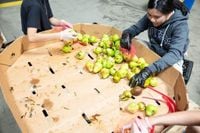As the United States grapples with sweeping changes to its food assistance programs, millions of Americans are bracing for a period of uncertainty, confusion, and potential hardship. Recent federal and state actions have set off a cascade of reforms to the Supplemental Nutrition Assistance Program (SNAP), commonly known as food stamps, with far-reaching effects for families, local governments, and the food industry at large.
The U.S. Department of Agriculture (USDA) recently issued a memo requiring all states to implement the changes to SNAP mandated by President Trump’s One Big Beautiful Bill Act (OBBB) by November 1, 2025. According to Food Tank, these changes include stricter work requirements, the termination of longstanding eligibility waivers, and new rules for program administration. The Congressional Budget Office estimates that approximately 4 million people per month will lose some or all of their SNAP food benefits once the changes are fully rolled out. This includes families with children, older adults, people with disabilities, young adults aging out of foster care, and veterans.
For many states, the abrupt timeline has thrown agencies into a scramble. The Food Research and Action Center (FRAC) says state agencies typically need 12 to 18 months to implement such major changes, but are now being forced to act in less than one month. "This hastened timeline will lead to unnecessary chaos and confusion in the midst of widespread uncertainty, record inflation, and a government shutdown," warned FRAC President Crystal FitzSimons in a statement cited by Food Tank.
Retailers and their customers are also feeling the pressure. A joint statement from the National Association of Convenience Stores, National Grocers Association, and FMI – The Food Industry Association highlighted that the changes represent "significant new costs and operational challenges." Upfront costs to implement the new SNAP purchasing restrictions are estimated at $1.6 billion, according to a recent trade group report.
The impact is being felt acutely at the local level. In California, the USDA’s October 10 order ended waivers that had exempted able-bodied adults without dependents from work requirements. Now, starting November 1, 2025, CalFresh recipients in San Diego and across the state will have just three months to find work before losing benefits. As reported by The San Diego Union-Tribune, San Diego County officials estimate that 96,000 people in the region will be subject to the new requirements. The state’s previous waiver, justified by insufficient job availability, was abruptly canceled, along with similar waivers in six other states and 25 states with partial waivers.
Before OBBB, adults without disabilities between the ages of 18 and 54 could only receive SNAP benefits for three months in a three-year period without being employed for at least 80 hours a month. The new law narrows exemptions to only those aged 65 and older and parents with children under 14, removing protections put in place during the Biden administration for veterans, people experiencing homelessness, and former foster youth under 24. "This new guidance effectively ends food assistance for thousands of San Diegans overnight," said Alondra Alvarado, president and CEO of the San Diego Hunger Coalition. "We’re already hearing confusion and fear from community partners, and we expect food banks and meal programs to be overwhelmed as people lose benefits far sooner than expected. This policy punishes people for being poor — not for failing to work."
California now faces potential billions in new costs due to penalties for SNAP payment errors. The state must hire an estimated 426 staff just to administer CalFresh, according to county officials. The California Association of Counties warned that unless the state backfills federal cuts or relieves counties of state mandates, "we’ll be forced to slash core local services from public safety to parks." In September 2025, California received about $45 million of a requested $91 million to address the administrative workload, but officials say it’s not enough.
Meanwhile, the U.S. government shutdown that began on October 1, 2025, has only exacerbated these challenges. With Congress deadlocked over the budget, 750,000 federal employees have been furloughed, including about 42,000 at the USDA. As Food Tank reports, this has led to major disruptions in agency operations, including delays in disaster-assistance payments and loan processing for farmers. "Young farmers run on tight cash flow," said Vanessa Garcia Polanco of the National Young Farmers Coalition. "Disruptions like this can tip a season—or a business—over the edge."
States are also taking their own steps to reform SNAP. In Iowa, the Department of Health and Human Services announced that, starting January 1, 2026, soda, candy, gum, and other foods deemed unhealthy will no longer be eligible for purchase with SNAP benefits. The move, approved by the USDA earlier this year, is intended to "promote healthier eating habits among Iowans receiving SNAP benefits," according to Iowa HHS Director Kelly Garcia. "By limiting SNAP-eligible purchases to healthier foods, this is a practical step toward encouraging better eating habits and supporting long-term health."
However, not everyone is on board. Advocates for food assistance and anti-hunger programs, as well as some state lawmakers, have criticized the restrictions. Luke Elzinga, board chair of the Iowa Hunger Coalition, argued that "these restrictions will do nothing to lower the cost of healthy food for Iowans facing hunger and food insecurity." State Representative Rob Johnson added, "Limiting food assistance isn’t fiscal responsibility, it’s cruel. When we take food off the tables of Iowans already struggling to make ends meet, we’re not solving problems, we’re creating them."
While the U.S. faces these domestic food policy upheavals, global efforts to improve nutrition and sustainability are also making headlines. The EAT-Lancet Commission’s latest report advocates for a "Planetary Health Diet," which could reduce greenhouse gas emissions by 15 percent and help avoid roughly 11 million deaths annually. The Commission calls for doubling the consumption of fruits, vegetables, nuts, and legumes while reducing animal products, emphasizing that healthy diets are both a human right and a shared responsibility. Jess Fanzo, a member of the Commission, noted that this focus on justice was "largely absent" in the 2019 report.
On the international stage, the High Seas Treaty—ratified by 75 countries as of October 2025—will enter into force in January 2026. The treaty is the first legal framework to protect the two-thirds of the ocean that lie beyond national jurisdiction, aiming to address overfishing, climate threats, and deep-sea mining. Yet, some experts, like Guillermo Crespo of the International Union for Conservation of Nature, warn that without participation from major fishing nations such as China, Russia, and Japan, the treaty’s impact could be undermined.
Amid these policy shifts, research published in Nature Ecology & Evolution highlights the promise of agroecological approaches like zero budget natural farming (ZBNF) in Andhra Pradesh, India. The study found that such methods boost farmers’ profits, maintain crop yields, and improve bird biodiversity, offering a hopeful model for sustainable food systems.
As Americans adjust to the new SNAP landscape and policymakers debate the best path forward, the stakes for food security, public health, and social equity have rarely felt higher. The coming months will test not only the resilience of those who depend on food assistance, but also the capacity of governments and communities to respond with compassion and foresight.




